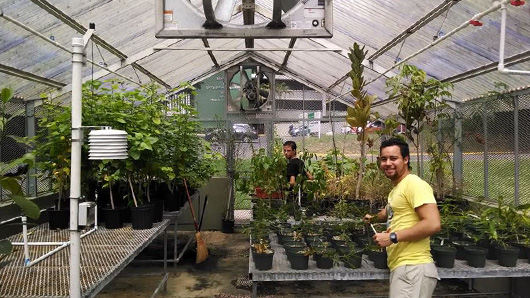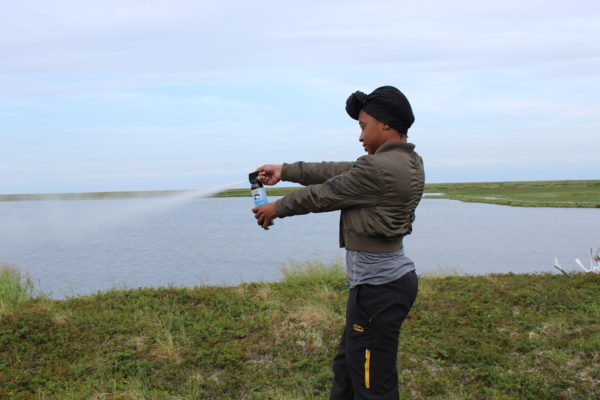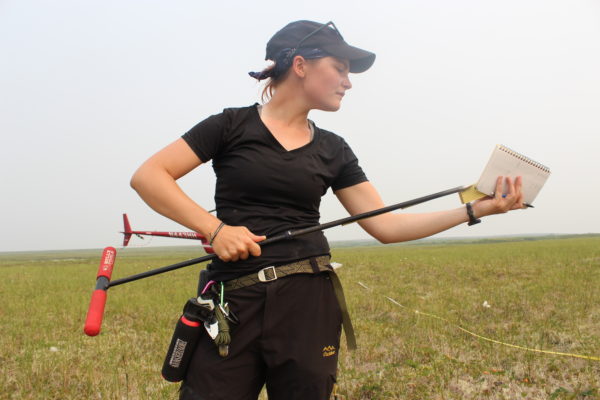Being the only participant who comes from Puerto Rico (where it is summer practically the whole year and where English is not the first language), the decision to go to live in Siberia for a month, in a barge parked on a river, with a bunch of strangers the majority of whom just speak English, represents a great and exciting challenge to me. I accepted this challenge, and when we all met each other a few weeks ago, at the Woods Hole Research Center in Falmouth, Massachusetts, for the Arctic Field Training, I had a very nice and joyful experience.
In the Arctic Training, we did many things together, like learn about how to deal with bears, camping skills, about first aid and even about satellite phones. However, something that was particularly interesting was the chance to talk to each other about our research interests. That’s something that is important, because when you know more about what interests people, in some way, you learn more about them as individuals.
I am from the tropics, and in my case since I was a kid, all my education in science has been mainly about the Tropical Environment. It is a biome that I am very used to, scientifically speaking. So…why do I want to go to the arctic tundra? Because, as scientists, we have to develop a holistic way to see the world and how it works, in order see about how things are connected in some way. Knowing that, its clear to me that what could happen in the Arctic could also affect the whole world, including the Caribbean, my home.

At the Botanic Garden of the University of Puerto Rico. Growing endemic plants in a greenhouse for a Wetland Restoration Project at Cataño, PR.
That’s why my particular research interest in this project is to study how the arctic tundra is changing, in terms of the spatial distribution of the vegetation. What is causing these changes? And how can these changes affect the whole ecosystem, in terms of landscape and productivity? This is important because this behavior of the ecosystem could have an effect on the potential release of methane from thawing permafrost.
I know that a lot of good experiences are waiting for us in Chersky, and I am willing to finally live them.
So, stay tune for more about how this Caribbean guy is dealing with the Arctic.
En Español
Al ser el único participante que viene desde Puerto Rico (en donde es verano prácticamente todo el año y donde el inglés no es el primer idioma), tomar la decisión de ir a vivir a Siberia por un mes, en una barcaza estacionada en un río, con un grupo de extraños, de los cuales la mayoría solo habla inglés, representó un gran y excitante reto. Acepté la oportunidad, y cuando todos los participantes nos conocimos hace unas semanas atrás, durante el Entrenamiento de Trabajo de Campo en el Ártico, en Woods Hole Research Center, en Falmouth, Massachusetts, fue una experiencia totalmente gratificante.
Durante el entrenamiento hicimos muchas cosas juntos, como por ejemplo aprender a lidiar con osos, practicar nuestras habilidades de acampar, primeros auxilios e inclusive aprendimos sobre teléfonos satelitales. Sin embargo, algo que fue particularmente interesante, fue tener la oportunidad de hablar sobre nuestros intereses de investigación. Esto fue algo importante, porque a medida que conocemos más sobre los intereses particulares de las personas, en cierto modo logramos conocerlos como individuos.
Soy del trópico, y en mi caso, desde que era un niño, toda mi educación en ciencias ha estado enfocada principalmente sobre los ambientes tropicales. Es un bioma del cual estoy muy familiarizado, científicamente hablando, así que…¿porqué querer ir a la Tundra Ártica? Porque considero que como científicos debemos desarrollarnos para observar cómo funciona el mundo de una manera holística, y así lograr ver cómo todo está conectado de alguna forma. Sabiendo esto, tengo claro que lo que pase en el Ártico, en cierta manera también podría afectar a todo el planeta, incluyendo al Caribe, mi hogar.
Es por esta razón que mi interés particular de investigación durante este proyecto es estudiar cómo la tundra ártica está cambiando, en términos de distribución espacial de la vegetación. Me gustaría observar qué está causando este cambio, y cómo estos cambios pueden afectar a todo el ecosistema de la zona, en términos del paisaje y de productividad. Esto es importante porque este cambio en el comportamiento del ecosistema pudiera representar una potencial liberación del metano que se encuentra encapsulado en el permafrost, a medida que este se va derritiendo.
Se que muchas experiencias buenas están esperando por nosotros en Chersky, y estoy muy ansioso por finalmente vivirlas.
Manténganse al tanto, para que conozca más sobre cómo este caribeño se las arregla en el Ártico.




Comments(3)-
-
-
Max Holmes says
June 15, 2014 at 9:36 amAlmost all of the research at the Woods Hole Research Center is related to global climate change, and most of it is done in the tropics or the Arctic. Though this might seem like a strange combination at first, in fact it makes a lot of sense. That is because the large and vulnerable stocks of carbon on Earth are in the tropics (in forests) and the Arctic (in permafrost), so a holistic view of Earth’s climate system requires particular attention to these regions. So I love it when students/scientists from the tropics go to the Arctic, and when students/scientists from the Arctic go to the tropics!
John Wood says
June 15, 2014 at 7:21 pmLuis,
Great thoughts! I really relate to the ideas of making those connections between different parts of the world and looking at the holistic view. That is important for the students to understand, as well as the public.
Thanks,
See you soon,
John
María Grullón says
July 11, 2014 at 1:55 amHijo mio, me siento muy orgullosa de ti por todos los logros que has obtenido y sé que esto es solo el comienzo de los que vendrán, disfrútalo, observa, aprende y cuídate, por favor, pero sobre todo pon a Dios por delante. Te amo!. Dios te bendice!